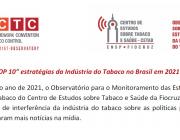
Para encerrar o ano de 2021, o Observatório para o Monitoramento das Estratégias da Indústria do Tabaco do Centro de Estudos sobre Tabaco e Saúde da Fiocruz selecionou 10 estratégias de interferência da indústria do tabaco sobre as políticas publicas no Brasil que geraram mais notícias na mídia. Da mesma forma, elencamos as “TOP 10” iniciativas promovidas pelos profissionais envolvidos no controle do tabagismo para expor a agenda da indústria do tabaco e a relevância do cumprimento do artigo 5.3 .
TOP 10 estratégias da Indústria do Tabaco no Brasil em 2021 / TOP 10 iniciativas para promover o controle do tabaco no Brasil em 2021. Cetab/Ensp/Fiocruz, Rio de Janeiro, 14 dez. 2021. 9p.
After more than a decade of pressure from increasing government tobacco controls, a growing illicit cigarette economy and changing consumer attitudes towards smoking, South Africa's Tobacco industry was subjected to a twenty-week prohibition on the sale of all raw tobacco leaf, processed tobacco and all manufactured tobacco products under lockdown measures. This led to the industry losing significant market share to illicit cigarette sales. The industry also faced an 8% increase in excise duties and announcements of renewed government efforts to finalise further tobacco controls.
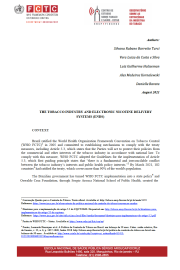
By ratifying the World Health Organization's Framework Convention on Tobacco Control (FCTC/WHO) in 2005, Brazil committed to establishing mechanisms to comply with the treaty's measures, including article 5.3 which states that “the Parties shall act to protect these policies from the commercial interests and other interests of the tobacco industry, in accordance with national legislation”. To support compliance with this measure, Guidelines were defined for the implementation of article 5.3, whose first guiding principle states that “there is a fundamental and irreconcilable conflict between the interests of the tobacco industry and the interests of public health”. By March 2021, 182 countries Parties had ratified the treaty, which covers more than 90% of the world's population.
TURCI, Silvana Rubano Barretto; SILVA, Vera Luiza da Costa e; HALSSEMAN, Luiz Guilherme; KORNALEWSKI, Alex Medeirosi; BARATA, Danielle. A indústria do tabaco e os dispositivos eletrônicos para fumar (DEFS). Cetab/Ensp/Fiocruz, Rio de Janeiro, 1 set. 2021.
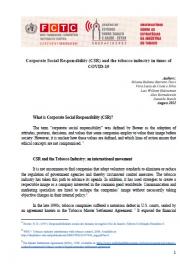
It is not uncommon to find companies that adopt voluntary rules to eliminate or reduce the regulation of government agencies and, therefore, circumvent control measures. The tobacco industry has taken this path, as a way of privileging its agenda. Furthermore, it has used strategies to create a respectable image, as a company interested in the common good, all over the world2. Communication and marketing specialists are hired to reshape the company's image, without necessarily making any objective changes to the company's internal policy.
TURCI, Silvana Rubano Barretto; SILVA, Vera Luiza da Costa e; HALSSEMAN, Luiz Guilherme; KORNALEWSKI, Alex Medeiros; BARATA, Danielle. Responsabilidade social corporativa (RSC) e a indústria de tabaco em tempos de Covid 19. Cetab/Ensp/Fiocruz, Rio de Janeiro, 1 set. 2021.
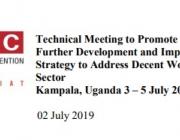
"The WHO Framework Convention on Tobacco Control (FCTC) was: 1 negotiated under the WHO Constitutional Mandate; 2 becoming the first convention with a modern structure with objectives in the field of Public Health, but also addressing the social, economic and environmental impact of tobacco. It currently covers more than 90 percent of the global population. It is an evidence-based treaty addressing both the supply and demand of tobacco products and reaffirms the right of all people to the highest standard of health. It guides and informs the global tobacco control agenda and is a legally binding instrument."
DECLARAÇÃO da Secretaria da Convenção-Quadro da OMS para o Controle do Tabaco e o Protocolo para Eliminar o Comércio Ilícito de Produtos de Tabaco. Secretariado da Convenção-Quadro para o Controle do Tabaco, Uganda, 2 jul. 2019.
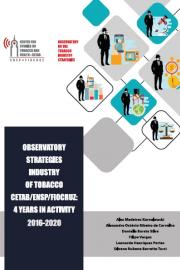
General report that presents an overview of the last 4 years (2016-2020) on the activities of the Observatory team, as well as data on the interference variants of the tobacco industry in Brazil.
TURCI, Silvana Rubano Barretto et al. Observatory on the Tobacco Industry Strategies: 4 years in activity (2016-2020). Cetab/Ensp/Fiocruz, Rio de Janeiro, 17 ago. 2021. 39p.
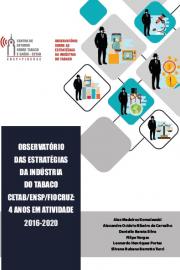
Relatório geral que apresenta um panorâma dos últimos 4 anos (2016-2020) sobre as atividades da equipe do Observatório, além de dados quanto as variantes de interferência da indústria do tabaco no Brasil.
TURCI, Silvana Rubano Barretto et al. Observatório das estratégias da indústria do tabaco: 4 anos em atividade (2016-2020). Cetab/Ensp/Fiocruz, Rio de Janeiro, 17 ago. 2021. 40p.
Notícia que apresenta os diversos produtos derivados do tabaco: vapes, vaporizadores, canetas vaporizadores, canetas narguilé, cigarros eletrônicos (e-cigarros ou e-cigs) e e-cachimbos no formato de eletrônicos de entrega de nicotina (ENDS). Os mesmos são produtos de tabaco não combustíveis. Também apresenta dados estatísticos quanto ao consumo desses produtos.
VAPORIZERS, E-Cigarettes, and other Electronic Nicotine Delivery Systems (ENDS). U.S. Food & Drug Administration, Estados Unido, [s.l.]. https://www.fda.gov/tobacco-products/products-ingredients-components/vap.... Acesso em: 25 nov. 2020.
SARS-CoV-2 epidemics raises a considerable issue of public health at the planetary scale. There is a pressing urgency to find treatments based upon currently available scientific knowledge. Therefore, we tentatively propose a hypothesis which hopefully might ultimately help save lives. Based on the current scientific literature and on new epidemiological data which reveal that current smoking status appears to be a protective factor against the infection by SARS-CoV-2 [1], we hypothesize that the nicotinic acetylcholine receptor (nAChR) plays a key role in the pathophysiology of Covid-19 infection and might represent a target for the prevention and control of Covid-19 infection.
Changeux JP, Amoura Z, Rey FA, Miyara M. A nicotinic hypothesis for Covid-19 with preventive and therapeutic implications. C R Biol. 2020 Jun 5;343(1):33-39. doi: 10.5802/crbiol.8. PMID: 32720486.
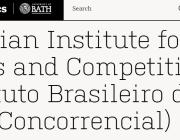
The Brazilian Institute for Ethics and Competition (ETCO) is a non-governmental organisation that works with multinationals and trade associations from the tobacco, alcohol, soft drinks, pharmaceutical, technology and fuel distribution sectors in Brazil. ETCO was co-founded by tobacco companies and receives undisclosed financial contributions from the industry. It lobbies heavily against the Brazilian government’s taxes on cigarettes.
BRAZILIAN Institute for Ethics and Competition (Instituto Brasileiro de Ética Concorrencial). Tobacco Tactics, Inglaterra, 10 fev. 2020. Disponível em: https://tobaccotactics.org/article/brazilian-institute-for-ethics-and-co.... Acesso em: 7 ago. 2023.